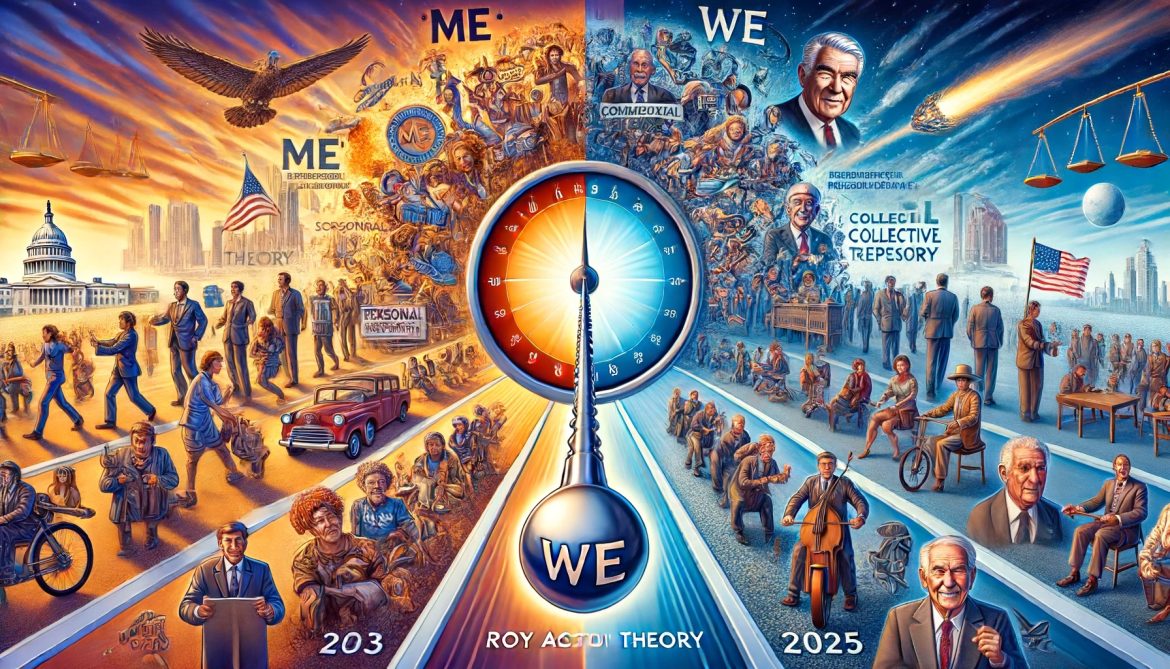In an insightful interview Roy Williams elaborates on his Pendulum Theory, offering a profound understanding of societal shifts. This theory, grounded in a 3,000-year observation, alternates between “Me” and “We” generations, each lasting 20 years in ascent and 20 years in descent.
Understanding the Pendulum Theory
Williams explains that the pendulum represents societal swings between individualism (“Me” generation) and collectivism (“We” generation). For example, the “Me” generation, as epitomized by Ronald Reagan’s era, emphasizes personal dreams and individual empowerment. In contrast, the “We” generation focuses on community, collective responsibility, and conformity for the common good.
Characteristics of the Me Generation
The “Me” generation thrives on individual achievements and personal dreams. It’s an era of self-empowerment where phrases like “I can do this” and “Tell me your dreams” dominate. This period lasts 20 years until it reaches a zenith, at which point the pendulum begins its descent into the “We” generation.
Transition to the We Generation
In the “We” generation, the emphasis shifts to the collective. The community becomes paramount, and individual desires are subordinated to the group’s needs. Productivity increases due to the collective effort, and the society prioritizes responsibility over freedom. This phase, too, spans 20 years in both rise and fall.
Historical Examples
Williams cites several historical examples to illustrate these shifts. During the zenith of a “We” generation, societies often experience witch hunts and authoritarian figures like Adolf Hitler, as people seek heroes to deliver them from perceived crises. Conversely, the “Me” generation witnesses the rise of individuality and personal freedom, as seen in the President Ronald Reagan era.
Current State and Future Predictions
Since 2003, we’ve been in a “We” cycle, with its peak anticipated around 2023. This period is marked by increased communal activities and collective action, with people advocating for societal good over individual gains. Williams predicts that by 2025, the pendulum will begin its next shift, potentially signaling a global transition from Western to Eastern dominance.
Related:
- A New Reformation of Church | 5 SPIRITUAL TRENDS BEGINNING 2016 THAT WILL CHANGE THE WORLD Rick Joyner
- God’s Building vs. Man’s Buildings: What does it mean to “build a church?”
- “15 Theses toward a Re-Incarnation of the Church” Wolfgang Simson
- Pendulum Theory, Me Vs. We Generations, We Are In A “We” – Business Relations
- Super Chicken Study & Super Church, Exploring Myths and Truths Part 1 of 3
- Social Capital Comes in Healthy Participatory Relationships | Super Chicken Study & The American Church Part 2
- Small is the New Big | Super Chickens Study and the American Church, Part 3
- The Why? For The Church, Is Challenged By Simon Sinek
- DESERTED: Standing Strong When Others Have Deserted Their Faith
Business and Community Implications
Understanding these generational shifts is crucial for businesses, ministries, and communities. Williams suggests that businesses should adapt to the “We” generation’s values by fostering communal environments and emphasizing teamwork. Similarly, ministries and community organizations should focus on collective well-being to remain relevant and effective.
Preparing for the Shift
As we approach the peak of the “We” generation, it’s essential to recognize the impending changes. Businesses and organizations must realign their strategies to resonate with collective values. The anticipated global shift in 2025 underscores the importance of strategic foresight and adaptability.
Conclusion
Roy Williams’ Pendulum Theory provides a valuable framework for understanding societal shifts. By recognizing the cyclical nature of these changes, we can better prepare for the future. The upcoming transition in 2025 offers an opportunity for global realignment, emphasizing the need for strategic planning and adaptability in an ever-evolving world.




